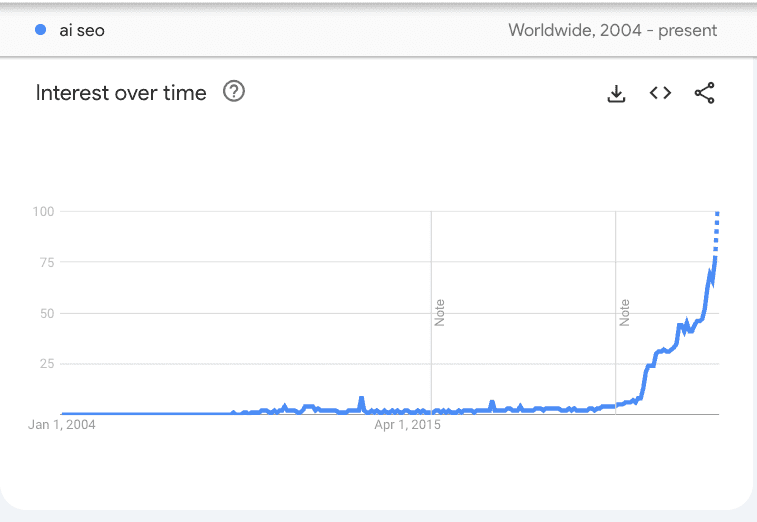The AI SEO market will triple to $3.06 billion by 2033. But most marketers are drowning in acronyms.
You've seen the terms:
- AI SEO: AI Search Optimization
- GEO: Generative Engine Optimization
- LLM SEO: Large Language Model SEO
- LEO: LLM Engine Optimization
- LLMO: LLM Optimization
- AEO: Answer Engine Optimization
- AIO: AI Optimization
Let's break down the each term and look at the real data.
- AI SEO market growing from $1.5B to $3.06B by 2033 with 8% annual growth.
- AI overviews now appear in 47% of Google search results, reducing organic traffic by 15-25%.
- 84% of marketers believe in using AI for SEO, but 6+ competing terms create confusion.
- "AI SEO" emerged as the clear industry standard, used by 35% of businesses for content strategy.
With AI overviews reaching 1.5 billion users monthly and appearing in nearly half of all search results, understanding this space isn't optional anymore.
The $3 billion terminology problem
When ChatGPT exploded in late 2022, marketers scrambled to name this new optimization category. The result? A mess of 6+ competing terms that mean basically the same thing.
This confusion costs real money.
- 47% of Google searches now show AI overviews
- 15-25% drop in organic traffic from AI-powered results
- 50%+ decline in click-through rates when AI overviews appear
Yet 84% of marketers believe in AI SEO while using different terms to describe identical strategies.
The market has spoken: AI SEO won.
AI SEO: AI Search Optimization

AI SEO is the term everyone understands. It’s direct, memorable, and instantly signals "search optimization for AI"
Other acronyms (GEO, LEO, LLMO, AEO, AIO) confuse more than they clarify.
Marketers, execs, and platforms all default to "AI SEO" because it’s clear and actionable.
If you want buy-in, use the language your audience already knows.
Compare these explanations to your CMO:
- "We need a GEO strategy" → "What's a GEO?"
- "We need an LLMO approach" → "What's an LLMO?"
- "How is our AEO/AIO?" → "What's AEO/AIO?"
- "We need an AI SEO strategy" → "Got it, SEO for AIs."
AI SEO builds on 25 years of SEO knowledge. Every alternative forces you to explain acronyms first.
Major SEO platforms, like Semrush, BrightEdge, and Ahrefs, all standardized on "AI SEO" terminology. When the tools adopt it, the market follows.
GEO: Generative Engine Optimization

Princeton researchers coined "Generative Engine Optimization" in their groundbreaking study. It's technically precise and research-backed.
The problem: Too academic for practical use.
When to use GEO: Research papers, academic discussions, impressing data scientists.
LLM SEO: Large Language Model SEO

"Large Language Model Search Engine Optimization" gets about 180 searches per month globally, compared to 2,800 for AI SEO.
Over the past year, AI SEO interest grew 957%, while LLM SEO barely moved.
Bottom line: LLM SEO is accurate, but too technical for most marketers. It requires explaining what an LLM is to business owners.
Do the test: Ask random people (or your mom) what "LLM SEO" means. Most will just shrug. But ask about "AI", everyone already knows.
LEO: LLM Engine Optimization

A few agencies pushed "LLM Engine Optimization" as the cool short version.
Problem: Nobody outside those agencies used it. Plus, people think astrology.
LLMO: LLM Optimization
"Large Language Model Optimization" tries to simplify LLM SEO but still requires technical explanation.
Reality: Another acronym that confuses more than it clarifies.
Usage: Niche AI optimization discussions, technical documentation.
AEO: Answer Engine Optimization
"Answer Engine Optimization" specifically targets optimizing for AI systems that provide direct answers rather than links.
The issue: Too narrow—focuses only on answer engines, not the broader AI search landscape.
Usage: Voice search optimization, featured snippet strategies.
AIO: AI Optimization
"AI Optimization" could mean chatbot optimization, recommendation engines, or machine learning performance.
Result: Too vague to be useful as a category.
Conclusion
Whether you call it AI SEO, GEO, AEO, LLMO, or "making ChatGPT like my content," the core strategies are identical:
What actually works
- Get cited by AI engines - Be mentioned when AI answers questions
- Structure for AI consumption - Format content so AI can understand and reference it
- Build authority signals - Establish expertise AI engines trust
- Track visibility across platforms - Monitor ChatGPT, Perplexity, Claude, Google AI
Focus on platforms, not terminology
Your customers are searching on:
- ChatGPT (including Search)
- Perplexity
- Claude
- Google AI Overviews
- Bing Copilot
Each has optimization nuances, but fundamentals overlap.
The bottom line: AI SEO won, now what?
The terminology war is over. AI SEO became the standard because it's:
- ✅ Accessible to non-technical marketers
- ✅ Builds on existing SEO knowledge
- ✅ Adopted by major platforms and tools
- ✅ Growing at 8% annually to $3.06B market
But here's what actually matters: Are you visible when customers ask AI about your industry?
With 47% of searches now showing AI overviews and 15-25% traffic shifting to AI responses, optimization isn't optional.
Stop debating terminology. Start tracking results.
See where you stand across all major AI engines. Track ChatGPT, Perplexity, Claude, and Google AI citations in one dashboard.
Get your free AI SEO scan →2-minute scan. No signup required.
Sources: Market data from Consain Insights, SEO.com, BrightEdge, and academic research from Princeton University.

